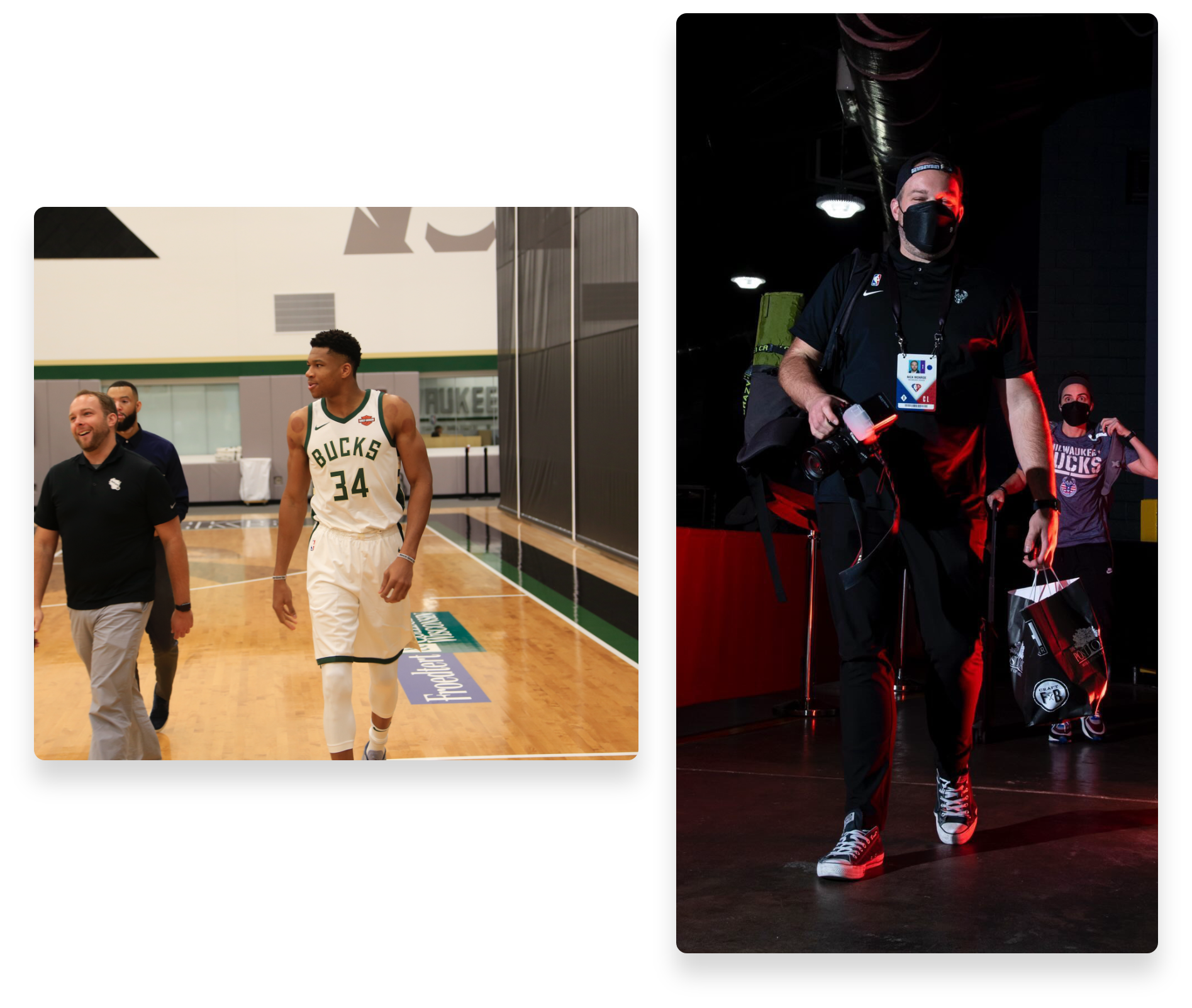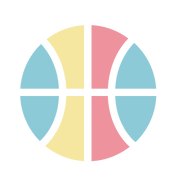Tell me a little about your journey within basketball so far?
I'm Nick Monroe. This is my 17th NBA season. I started off as a young basketball fan growing up here in Milwaukee as a fan of Big Dog, Ray Allen and Sam Cassell. Coming out of college, I sort of fell into a job selling tickets for the team. Quickly as the internet continued to evolve, I was able to start doing some social media for us developing our social strategy. In the early days of Twitter and Facebook we were one of the first teams to be on these platforms. I helped nurture that community and helped it grow into the behemoth that it is today in terms of a massive media operation with a global reach.
I went from a ticket salesperson to becoming the Director of Content with the Milwaukee Bucks overseeing all of our web, social, and mobile content. I’m honored to be able to tell the stories of our players, our team, and our city.
All time greatest Buck?
Oh man, well, it’s Giannis Antetokounmpo. But he's still writing his story; two-time MVP, Defensive Player of the Year, NBA Finals MVP. What he's done in only seven years has been incredible. Committing to the city and bringing the first championship back in 50 years I think cements his legacy as the greatest Buck of all time.
If you can add any classic Bucks player to this 2021/2022 Roster. Who would it be?
Ray Allen, no doubt. I mean that might even be cheating. His shooting with the spacing that these guys would create for him would be next level. To be honest, Big Dog was my favorite growing up. In Milwaukee, Big Dog was our guy. Everybody loved him. The number one pick from Purdue had a great mid range game. He was essentially a Carmelo Anthony type of score back then, and his game, I think, would translate well to today’s game.
Biggest heartbreak as a Bucks fan?
It was definitely the 2001 Eastern Conference Finals. Going into Philly, we were up in game five and The Big Dog had a shot to win the game from the corner and missed it. We ended up losing that series in seven games. Scott Williams got suspended for the seventh game and we were down our starting center. I think that that was our biggest disappointment because we beat the Lakers twice that year. And I think if you were to put that Bucks team with that high potent offense in the playoffs it would have been a fun matchup to see those guys go against Kobe and Shaq and it could have been a totally different thing. But then we never would have gotten that Allen Iverson meme stepping over Tyron Lue.
I can probably guess your favorite moment as a Bucks fan.
It was definitely that: Winning the NBA Finals. I also want to point out the last game we ever played in the Bradley Center, which is actually close to one of the hardest heartbreaks too, because we lost to Boston in seven games in 2018. But in game six that building was as loud as it has ever been, and to send that building off with a win, everybody left on a high with great memories of a purely electric crowd in that building. That was a really cool moment.

When did your creative journey begin? And when did that cross paths with basketball?
Back in high school. I was our basketball team's video manager. Not knowing really what I was doing at the time, I would do some scouting for us. I would shoot film of other teams we had coming up to give to our coaching staff. Then I actually created a few mixtapes at home for our team’s highlights, plays of the year and that sort of stuff. I didn't really have a great setup. I had a couple VCRs and I was able to dub some audio over it. I would get really creative in the way I would serve those mixes up without really having professional equipment. Then after my first year with the Bucks, I led my group in sales, which allowed me to get some flexibility and freedom to be able to advance creatively - doing some of the social media work I wanted to do, and start playing around in that space and create a community.
Way back in 2008 the social media community was super small. People were doing tweet ups and meetups and that sort of thing. Really trying to cultivate a community of fans and do some real one-to-one sort of marketing. That was some of my favorite stuff that we did: being able to create a small passionate group of Bucks fans that we could talk with during games. That really led down the path of creating more content and being able to do more of the larger scale stuff that we do today.
30 NBA squads means 30 content teams. While they battle on the court, how’s the battle off of it in the content world? Is there competition in creating the best content in the NBA?
Yes and no. There's competition but there isn't because everyone's market is different. Every team has different marketing goals for their organization. I think that there is competition in terms of everybody wanting to have some of the best content out there. It allows everybody to bounce creative ideas off seeing what other teams are doing. You know “Team X” really did a great job with this, we have to make sure our next jersey launch is better than that.
A rising tide lifts all boats. Teams are constantly elevating their game and making everybody constantly do the same. When we were going in on our playoff run this year, we analyzed and looked at the last few NBA championship runs and what content teams have put out when they won the NBA championship. Not just across the NBA, but across other leagues in sports like the Premier League, NFL with the Super Bowl, and so we've really been able to study what other teams have done across other sports. That allowed us to capitalize on that moment.
That's really what I think is the best part, because you have such great content examples out there, you really have some great work you can point to elevate it and do things differently and tell it in your own unique way. Coolest thing about the NBA is that teams are totally cool if you see something and reach out to that team and be like, “Hey, how'd you guys do this?” “What was your thought process on building this? How long did it take?” How many people were working on it?” Teams are totally cool with sharing that information— they want other teams to do better because that's gonna push them to create great content. We try to not rest on our laurels and do the same thing year over year. We're always trying to push the envelope, push to do more content, push to do new content. So I think it's a great, friendly competition for sure.

The Content creation world is fast paced, constantly releasing new media to consume. With all the noise we are exposed to daily, what is your approach in creating compelling content?
To be honest, our approach is to be as authentic as you can be. I know it sounds cliche, so to speak, but we really let our player personalities speak for themselves and be the stars. We try to keep our content as raw and as authentic as we can. We're not doing super overhype mixtapes and that sort of thing. We're trying to show our players’ personalities and show off candid moments behind the scenes. We know that there's many people out there that are going to cut up highlights and do mixes and we let them have that lane on their own. What we try to do is highlight the stuff that people can't see in terms of the player personalities, showing off the behind the scenes access that we get, and really trying to gear our players to our fans. I think that’s how we get the best content out there. Our fans can rationalize the player on a real level. It helps them to become more invested in the product and more invested in the player. And we try to do everything we can to serve our players in terms of being a resource for them, whether they need photos, they want video highlights, whatever they need. We always want to make sure that we're there for them to help grow their brand, grow their social media, help them interact and engage with their fans. And that benefits us too because we're able to get access to great moments.
What does a day to day look like for a director of content?
Oh, man, every day is different. I would say on our side we have our content schedule, our content plan that we go through on a day to day, week to week, but it really depends on whether we're looking at a game day, practice day, or an off day. Yesterday was an off day for the team so I was in the office pretty much all day long. Having meetings, working with our video production team, our graphics team, developing some pieces with our partnership team, really spending that day strategizing, and developing stuff that we want to release over the next couple of weeks into 2022. And then on a practice day like today, we would spend the majority of the day here, as I am right now at our training facility shooting behind the scenes content with our video producers. And, we have some zoom calls after interviews that our players will be doing to see what's going on in their lives, and what sort of storylines we can approach.
Are there any artists/creators that you look to for inspiration?
My Instagram feed is definitely filled with all sorts of different sources whether it's editors, photographers, and/or illustrators to garner some inspiration from. I've been able to tap some of those folks to do some one-off projects with us, which have been super fun. I think the whole sports creative community has been super engaging. When people show off their work, I think it's really great— whether they're behind the scenes, or creating YouTube videos on how they built some of their graphic stuff. Being able to be so transparent, and willing to show up for their content, because then they know they're trying to elevate the game for everybody else. I always look for inspiration outside of sports too because we don't want to just do what every other team in sports is doing. We look to inspiration in fashion, from photography to streetwear. We've been doing more retail photoshoots on our side, and I really love what Teddy Santis does with Aime Leon Dore. Their style, their aesthetic, and what they built that brand into, allow us to use some of those examples as we worked with our retail team last year on our lookbooks. That's where things really help elevate our launches. It was well received and we had some great data to show that it worked really well. So we look for inspiration not just across the sports world but really across fashion and in other industries as well.

What advice would you give a creator who is looking to make it in this career path? Where do you start and how do you get noticed?
Well, that's actually one of the benefits of being a creator now is that you can really start by just creating stuff on your own social media pages. Putting it out there and letting people interact and digest it. People have been super engaging with us that way. I know people that have just started doing mixtapes, and get reposted and start to grow from there. Being willing to be open and share your work and put the work out there for people to see and people to be able to critique it, I think is the best way to go out and do it. And then what you can do from there is work with a team or an agency - a brand or a sports media company, that might be able to contract you out as a freelancer at the start. I know there's a lot of teams that are out there hiring freelancers, or hiring part time graphics people and interns. I think there's a lot of different ways that you can break in from that. But even if you're not in a situation where you can be in the market to be an intern, I think being able to put your content out on the web and on social media and engage with the community is the best way you can go out there and try to make a name for yourself.
What’s next for Nick Monroe?
I want to continue to develop content. Continue to tell our player stories across as many mediums as we can and continue to look to grow our reach, and grow our fandom as large as we can. There's still so many untold player stories that we can tell that are super compelling. I want to just be able to find the proper outlets for those and be able to tell those to as large of an audience as we can.
That's really the end goal: being able to tell the stories of these world class athletes and show not only their humble beginnings or upbringings, but show how they make a positive difference in the community. Now as the world is sort of opening back up after the pandemic, I think that we're able to do so much more. We're limited in terms of stories we could tell because of the lack of face to face interaction we have with the underserved communities. I think being able to really open it up, and working on many more projects is super exciting.




